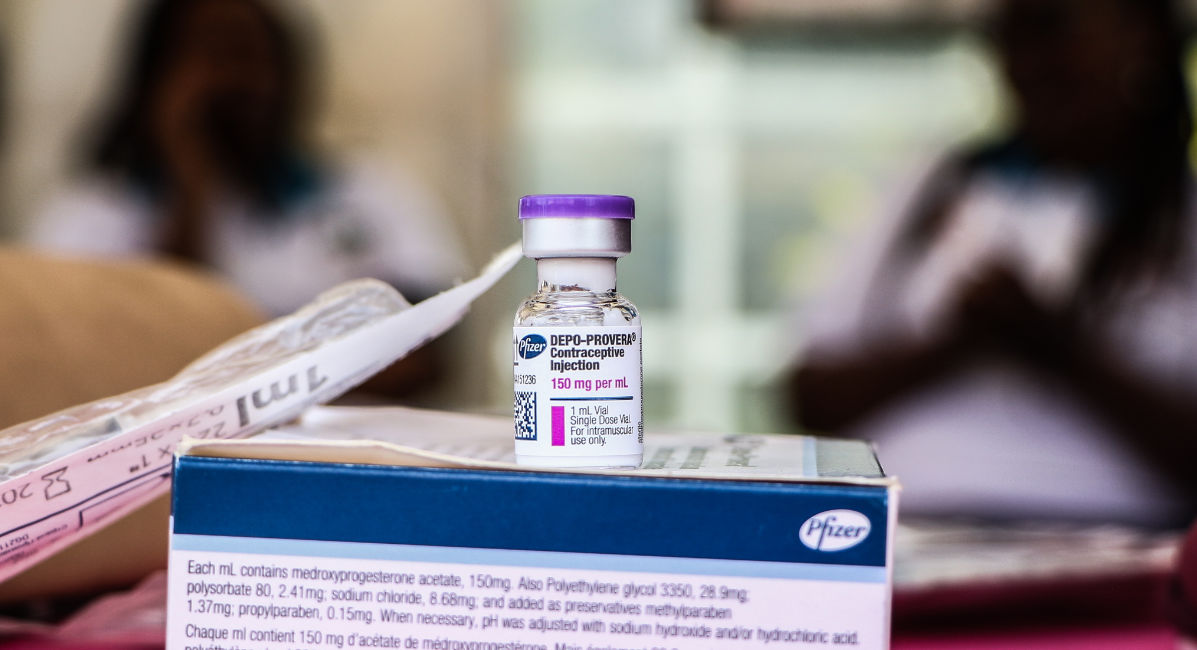(Population Research Institute) For decades, the Depo-Provera contraceptive injection has been questioned for many reasons. For example, its connection to a much higher rate of STDs. But recently, evidence has surfaced about an even more serious adverse event: brain tumors.
Depo-Provera is the brand name for the drug depot-medroxyprogesterone acetate (DMPA). This FDA-approved drug is an injectable contraceptive given to women every three months. It operates by both suppressing ovulation and thickening cervical mucus to prevent any sperm from reaching an egg if ovulation were to occur. This sounds simple enough, but like all pharmaceuticals, it comes with side effects.
Pfizer, the drug’s manufacturer, warns of the most common adverse effects on the drug’s latest label, including menstrual irregularities, abdominal pain/discomfort, weight gain, dizziness, headache, nervousness, and decreased libido. There is also a large warning for “LOSS OF BONE MINERAL DENSITY” followed by details on how severe this side effect can be. In total, the drug’s label goes on for 27 pages of potential effects.
But nowhere in their novella of a label, which was updated in July of 2024, is there a warning that DMPA can cause meningiomas or – as they are commonly known – brain tumors.
Yet, in March of 2024, a new study linking the use of progestogens, including medroxyprogesterone acetate, with an increased risk of intracranial meningiomas was released. This research emerged before Pfizer’s latest update of the DMPA label, yet the label still doesn’t reflect these findings. This is unacceptable, particularly given that the link between DMPA and brain tumors is supported by more than just clinical research.
American women suffering from meningiomas after using Depo-Provera are coming forward with their cases. As of this publication, 22 lawsuits have been filed against Pfizer, and at least 73 claims are pending in 17 judicial districts.
Pfizer failed to warn these women of this potential, life-altering effect, even after the research clearly establishing a link was published. The current lawsuits argue that Pfizer knew or should have known for years that its product was linked to the development of brain tumors, which the warning labels should have disclosed.
READ: New study reveals Depo-Provera could be more hazardous to women than previously known
While no amount of compensation can undo the harm of a life-altering tumor, at least these American women are able to seek justice against Pfizer and fight for recompense.
But as this legal battle goes on, you have to stop and think of the women outside of the U.S. who continue to be subjected to DMPA. Will those women ever see justice for the tumors potentially growing in their bodies? Will the flow of DMPA halt, even if Pfizer concedes that the drug causes meningiomas?
Since 1992, when the Food and Drug Administration approved DMPA for contraceptive use within the United States, USAID has funded the push of DMPA (under a variety of names) on women in developing nations around the world. PRI has been spreading awareness and fighting this since the 90s, when we reported on the abuses of women in Africa receiving Depo-Provera without informed consent and, in some cases, no consent at all.
Over the years, PRI has been able to cut U.S. funding to population control programs, which push contraception and abortion. Still, the flow of contraceptives, including DMPA, has never stopped completely. Between 1994 and 2000, USAID funneled over forty-one million units of Depo-Provera into the developing world, at a cost of over $40 million.*
More recently, under the Biden administration, the flow of USAID-funded DMPA continued. According to USAIDs “Overview of Contraceptive and Condom Shipments” from 2023, the most recent report available, the U.S. spent over $17 million on injectable contraceptives containing medroxyprogesterone acetate (the ‘MPA’ part of DMPA) as the main ingredient. With that money, over 19 million doses were pushed on women across Africa, Asia, and the Middle East.
If dozens of these meningioma cases are occurring in the United States, one can only imagine the thousands of women in Africa, Asia, and the Middle East, where millions of doses of DMPA have been sent for decades, suffering from the effects of DMPA as well. For all the women in the U.S. who chose to take Depo-Provera, there are even more women overseas pressured into taking one of the tens of millions of doses paid for by the United States, United Nations, and others.
While we await USAID’s report on exactly how many millions of doses were shipped to developing nations in 2024, it seems safe to assume that neither the research exposing DMPA’s harm, nor the U.S. lawsuits, will have slowed the shipments down.
For four years under Biden, USAID pushed contraception on women around the world, regardless of what those women wanted and regardless of the harmful, life-threatening side effects. Now, under the Trump administration and in light of the USAID shutdown, the population control rampage may be over. USAID will finally stop spending millions on toxic chemicals that poison women’s systems and, in some cases, kill them.
American women need to ditch cancer-causing contraceptives, and America needs to stop paying for these same drugs to be forced upon African, Asian, and Middle Eastern women.
*Numbers are from the Population, Health and Nutrition Projects Database (PPD), http://ppd.phnip.com. PPD is a computer-based information system managed by the Population, Health, and Nutrition Information Project on behalf of USAID’s Center for Population, Health and Nutrition. See also PRI Review, January-February 2003, 13(1), 5.
Editor’s Note: This article was originally published by Population Research Institute on February 11, 2025. Reprinted here with permission.








